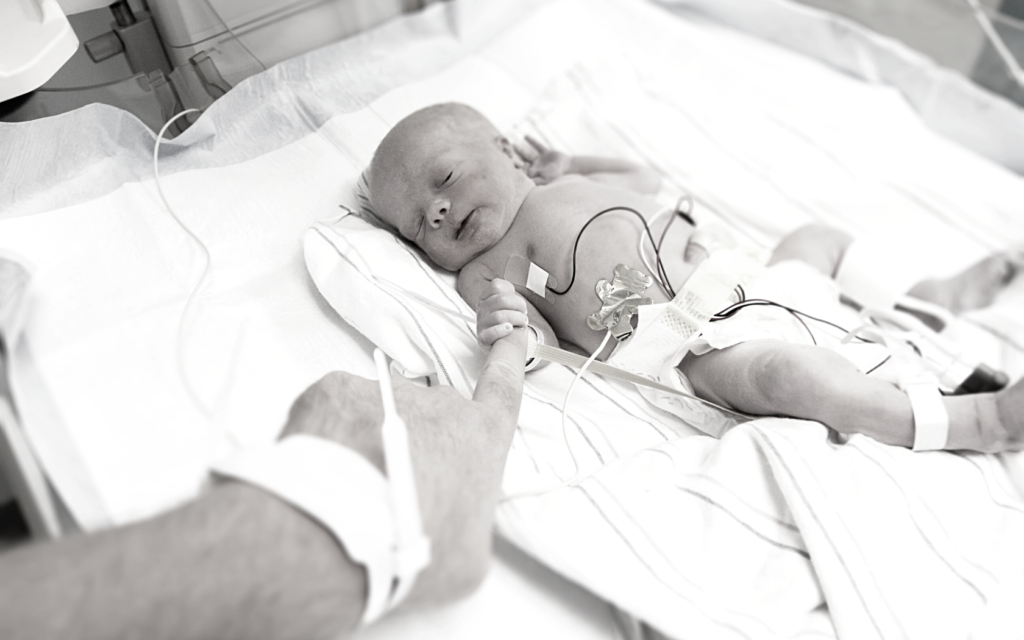“I would know if my baby had an injury during childbirth. My baby wasn’t premature, is a newborn brain bleed even possible?”
These are the type of questions parents may ask themselves when faced with a scary diagnosis. And the truth is, it can sometimes be difficult to diagnose a newborn brain bleed. The symptoms aren’t always obvious. It’s possible you may not even notice a problem until your baby misses an important milestone. Unfortunately, the longer it takes a doctor to diagnose a newborn brain bleed, the more extensive the damage may be.

What Is A Newborn Brain Bleed?
A newborn brain bleed is what you probably think it is – bleeding in an infant’s brain. Sometimes professional refer to it as a neonatal Intracranial Hemorrhage or ICH. This occurs when the blood vessels in the brain tear and blood spreads into other parts of the brain tissue.
Premature infants born more than ten weeks before their due date have the highest risk for newborn brain bleeds. However, full term infants may also develop ICH as well.
The cause of newborn brain bleeds can sometimes be stressful labor. They are fairly common and mild cases require no treatment and cause no harm to your baby. If a baby experiences a severe brain bleed, quick diagnosis and intervention can be the difference between life and death for a child.
How Do I Know If My Baby Is At Risk?
Early detection is important. Your doctor should pay attention to factors that put your child at a higher risk for developing a newborn brain bleed. Of course it’s always helpful to be well informed when it comes to the health of your child. Although your healthcare provider should know these risk factors, it’s helpful to know them yourself. That way you can look for symptoms if your baby is at a higher risk. Look out for:
- Premature Birth – The blood vessels in your baby’s brain are continuing to grow and strengthen during the last several weeks before birth. An early delivery puts your child at risk for developing a newborn brain bleed.
- Vacuum Or Forceps Assisted Delivery – A vacuum or forceps put pressure on the baby’s head. This can damage the blood vessels in the brain and cause bleeding..
- Difficult Or Emergency Deliveries – This includes emergency cesarean sections and breech deliveries.
- Slow Bleeding – Sometimes the brain bleed is so slow that damage occurs before symptoms do.
What Symptoms Should I Look For?
The severity of a brain bleed is between grades 1- 4. Grades 1-2 are usually not very significant and don’t necessarily require treatment. Grades 3- 4 cause more damage to the brain tissue and can produce dangerous symptoms. If your baby is showing any of these symptoms, it’s important to notify your doctor immediately.
- Seizures
- Swelling of the head or ears
- Decreased reflexes
- Changes in breathing
- Poor feeding/difficulty latching & sucking
- Lack of alertness
How Is A Newborn Brain Bleed Diagnosed & Treated?
If your doctor suspects a severe brain bleed, your baby will likely go to a Neonatal Intensive Care Unit, or NICU. There professionals will perform tests to see which areas of the brain are affected.This can include:
- Cranial Ultrasound – This can indicate whether or not surgery is necessary
- Magnetic Resonance Imaging, aka an “MRI,” will capture pictures of the brain by using radio waves
- CT Scans or computed tomography scans are highly detailed and take multiple images in a short period of time
Your baby may need a blood transfusion. If seizures are present, medication may be necessary for treatment. If surgery is necessary, a neurosurgeon may perform an Extraventricular Drainage, or EVD. This relieves pressure in the brain and can help lessen the concentration of blood and protein. Then a Ventricular-Peritoneal shunt may be necessary to prevent blood clots and excessive protein.

When Should I Contact An Attorney?
Usually no one is at fault when your baby suffers from ICH, but in some cases your obstetrician may have made decisions that contributed. When your baby is harmed because your doctor deviated from a reasonable standard of care, it’s considered medical malpractice. Here are some examples of medical malpractice that can contribute to a newborn brain bleed:
- Failure to identify that a newborn is in distress
- Unnecessarily long labor
- Giving a mother too much medication
- Improper use of forceps/vacuum
- Failure to identify that a baby’s in a breech position during labor
There are many reasons a healthcare provider may be liable for medical malpractice, these are just a few examples. If your child has suffered from a newborn brain bleed because your doctor was negligent, your family deserves to be compensated. We want to help you seek the compensation you need and the justice you deserve. Contact Hampton & King today to hold your doctors accountable and prevent other families from being harmed as well.




